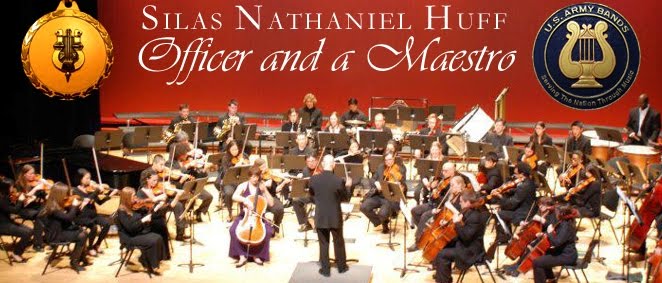Infantry Soldier: “What do you do in that band hall every day?”
Band Soldier: “Same thing you do in the field every day.
We train, so we can execute missions successfully.”
Principles of Army Training
1. Train as a Team. Obviously, an ensemble is a team. Musicians know the difference between practice and rehearsal (practice happens alone in a practice room; rehearsal happens with your team after you are already prepared as an individual), and the Army acknowledges the same phenomenon when training soldiers for combat operations. Team members practice on their own, but “train” as a team. They don't waste the team's time learning notes or working on technique in rehearsal.
2. Train as you Fight. This concept is fairly self-explanatory. Soldiers try to simulate real combat in training. Like musicians, they use the same equipment and work with the same people in training that they will execute the mission with. They train in similar environs, under the same conditions (lighting, weather, time of day, etc.). Musicians should strive to do the same. You wouldn’t use a different instrument on the day of the concert from the one you rehearsed with, right?
3. Prepare for your operational environment. See #2, and add to that: bring all the stuff with you that you will need. Remember: it’s better to bring too much equipment and not need it, than to wish you had your [whatever] when you have to perform. Have you ever showed up to a gig where there were no music stands? Played an outdoor gig and wished you had clothespins? Showed up in a pit and wished you had a stand light? "Prepare for your operational environment."
4. Train to standard, not to time. I love this one. Musicians, like soldiers, should rehearse until the music is “at standard.” What is the standard? That's tough to say. A musical performance, no matter how inspired, is never perfect – there is always something to improve – but a wise conductor knows when s/he has reached the pinnacle with an ensemble. Given the parameters (rehearsal time, repertoire, abilities of the players, preparation time, environment, etc.), the performance should be as good as it can reasonably be. That is the standard. If an ensemble reaches the standard, and there is still rehearsal time left, dismiss them early! Musicians love this! In fact, many players judge conductors based on how early they get to go home...
But if rehearsal time runs out and the [reasonable] standard is not yet reached, rehearse some more. Well...this concept works in the Army, where soldier-musicians are full-time, salaried, and at the beck and call of the Commander (Music Director). Civilian musicians typically have an orchestra manager or union rep who puts the kibosh on rehearsals that run over, which means conductors often have to settle for sub-par performance, knowing the ensemble can do better. Players often feel the same way, and in my experience professional musicians who are paid per service would often rather stay a few minutes longer and get it right, rather than say, “Well, time is up. I guess that’s as good as it’s gonna be.” Regardless, an ensemble should rehearse until it's right, ignoring the clock. In reality, you have to plan too much rehearsal time, or - if finances restrict your ability to do that - rehearse more efficiently!
5. Recovery is crucial. After every mission there is a recovery period. It includes physical recovery, but mostly it refers to the time needed to “reset” the organization to be ready for the next mission. In an orchestra, this is the time required for the library to recover/return/store the parts, the stage crew to break down/load out/store equipment, etc. For musical artists, the recovery period is often the after-party and sleeping in later tomorrow morning. Whatever you and your ensemble need to be prepared for the next “mission”—that is absolutely crucial to your success. Unless the gig was especially rough, your team won’t have PTSD, but they will need some recovery time.
So…for your next non-Army concert, enact some Army Training Principals. Get your players to prepare in advance so you can optimize your rehearsal time as a team, plan the rehearsals to be as similar to the concert environment as possible, bring all the equipment and supplies you could possibly need, plan sufficient rehearsal time so that the ensemble can reach its maximum potential (then let them go early!), and—for goodness sake—plan a good after-party.
























